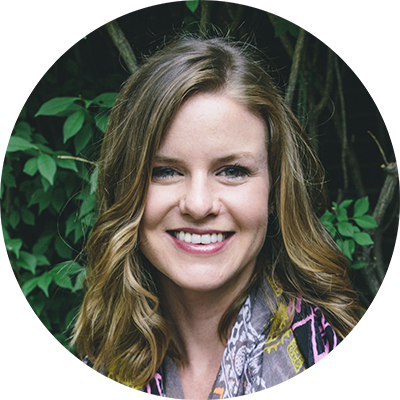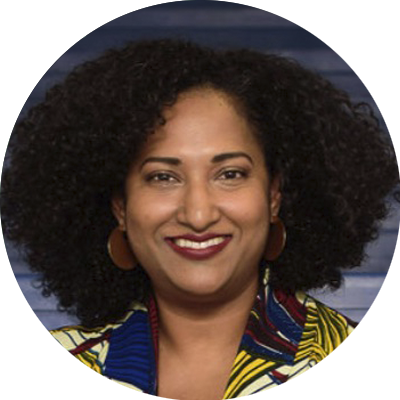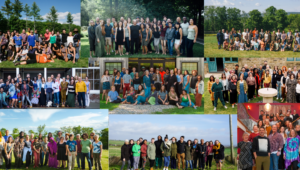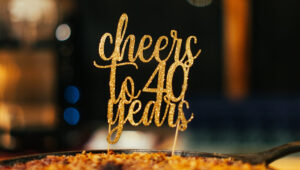NAS and our community are launching a pilot program to support leaders who are breaking down unjust systems within the arts and culture sector. In this program, leaders and their teams will examine the inequitable practices and structures their organizations have inherited. With the support of a peer community, tools and knowledge rooted in both research and lived experience, leaders will redesign and work towards the implementation of new, healthier practices.
The pilot, supported by Barr Foundation and others to come, will open for registration in summer of 2023 and launch in September.
Our decision to initiate this work came from what we’ve heard from our community over the past few years: that leaders today are facing monumental challenges with very little support. We’ve chosen to develop this program in a different way, using a co-design process, because this is a different kind of program: one that will support systemic change in our sector while also focusing on the health and well-being of those leading the change. To achieve this, we needed more perspectives, a greater range of ideas — especially coming from those the program is meant to serve. You can read more about the development process and our co-designers here.
As the program takes shape, we want to keep you, our community, informed of how we got here and where we’re headed next. The following is a conversation between Sunny Widmann, NAS Vice President of Programs and Partnerships and Kristina Newman-Scott, Executive Director of the Greene Space at New York Public Radio, NAS Board Chair, and a co-designer on this initiative.
First, does this program have a name?

Sunny Widmann
Not officially, not yet! In the beginning we called it “Rainbow Sprinkles” because that name evoked a sense of lightness and possibility in a dark time. We’ve since shifted to calling it “The Project Formerly Known as Rainbow Sprinkles” and now “The Project” (a la Prince, if you will!). We’ll call it “The Project” in this conversation.
What are the latest developments on The Project?

Sunny Widmann
We’ve worked with two different groups of collaborators in the design of this program. Among them are our NAS alumni, artists, leaders at different levels in organizations, researchers and academics. We now have a theory of change for the program, which includes what we want to happen as a result of this program, and a range of paths that could get us to that result. Our current focus is to work with a learning designer who can advise on how the different strategies might fit together in a cohesive framework that leads to change.
We also know more about who this is for: leaders and their teams coming from a wide range of organizational budget sizes, geographies, and artforms. The unifying characteristic is an inclination towards change. We are assembling a diverse group of leaders who offer different perspectives and lived experiences.
Why is The Project needed at this moment?

Kristina Newman-Scott
The Project is really about trying to shift systems. In the arts and culture community right now, there’s no shortage of performative and simple actions in the name of equity. We need to totally re-think HR, leadership structures, and boards — not just tweak around the edges. The Project will get to the root cause of the issues with these systems.
What are some of the outcomes articulated in the co-design process that really resonate with you?

Kristina Newman-Scott
That leaders will feel less isolated and a part of a supportive community is deeply important to me. There’s a bit of an “ED Jesus” element to how leaders are seen these days. They are expected to undo structures that have been in place for years and in many instances, expected to do it alone.
BIPOC leaders, in particular, are often faced with the additional pressure to immediately have all the answers, and be excellent in every way. As a BIPOC leader, you feel that you always have to work much harder and there’s more at stake in asking for help. It’s scary to admit that you don’t know something or need support. Will it be held against you? We’ve certainly seen examples of this with BIPOC leaders. They’re placed in leadership positions, are widely celebrated, but not always supported.
NAS creates the kind of caring, connected community where trust is intentionally built and connections are scaffolded. This is an explicit outcome of The Project. In programs I’ve experienced with NAS, it’s been like a dating service for leadership support.

Sunny Widmann
I find myself drawn to greater job satisfaction and well-being. This is not just for executive directors, but for teams, their community partners and artists. I think it was really important to name this explicitly while we are talking about redesigning systems, undoing and redoing. That is exhausting work. So we want the curriculum in The Project as well as the design of the program itself to focus on elements of care and sustainability. How do you structure workflow to break the norm of exhaustion? How can you develop a greater sense of self-awareness and self-compassion so that you know when rest is needed and feel empowered to actually take it?
What was the co-design process like?

Sunny Widmann
NAS convened, designed and facilitated the process. Our initial phase of co-creation was online due to COVID, held over several months of Zoom meetings with the co-creators. It felt right in moving to the second phase, as we got into more nuance about the shape and scope of the program, to work with a smaller group and do so on a more consolidated schedule. Vaccines and boosters enabled us to meet in person, which we felt was incredibly valuable.

Kristina Newman-Scott
It was amazing to have so many different kinds of thinkers in the room. Some folks were more academic and data focused, others deeply considering leadership structures, others more focused on community. I thought of it like a beautiful Venn diagram with all of these very different perspectives coming together to inform the goals of The Project.
No one was holding back, everyone was fully committed. Some things were challenging and hard to discuss, but the process and facilitation brought us through it.
Why is this program different from other initiatives in the field?

Sunny Widmann
To move away from the “ED Jesus” phenomenon you mentioned, Kristina, we’re incorporating support for teams and boards. EDs are at the center of organizational change work, but they can’t bring about change without a solid team. And we also want to make space for more horizontal organizational structures which may include multiple leaders rather than a single executive director.
We’re working to ensure that those participating are compensated. Participating in something like this is taxing on individuals and on the organization, and we want to try to mitigate as much stress as possible. The truth is that leaders often return home from professional development events to work that’s been piling up all week, a list of needs from family and colleagues, and the weight of falling behind on fundraising goals. These are real costs that take a toll on mental and physical health — as well as the organization overall. In order to create real change with The Project, we need to make sure that organizations are able to fill in the gaps created by participating. We’ll need strong partnerships with funders in the field in order to achieve this.

Kristina Newman-Scott
The Project is an effort to identify very specific challenges that lead to barriers for leaders. The tools offered through this program will allow them to target those issues effectively because the design is directly informed by those that The Project is trying to serve, so the barriers are really understood and there’s a greater chance of the solution actually working.
The Project was created with the field, which puts accountability at the center. And NAS is committed to evaluation and sharing.
What’s up next for The Project?

Sunny Widmann
The field has been asking for this program, and they’ve worked with us to design it. We now need funders to help us get this work off the ground. Interested in supporting this work to benefit your community? Please get in touch.
NAS is ready to launch the pilot this year for a limited number of participants. If you’re a leader who is interested in real change (not performative), being part of a growing movement, and working with the NAS community to further shape The Project, please let us know! Sign up for our updates list below.


